
ahnlich
Suite of tools containing an in-memory vector datastore and AI proxy
Stars: 115
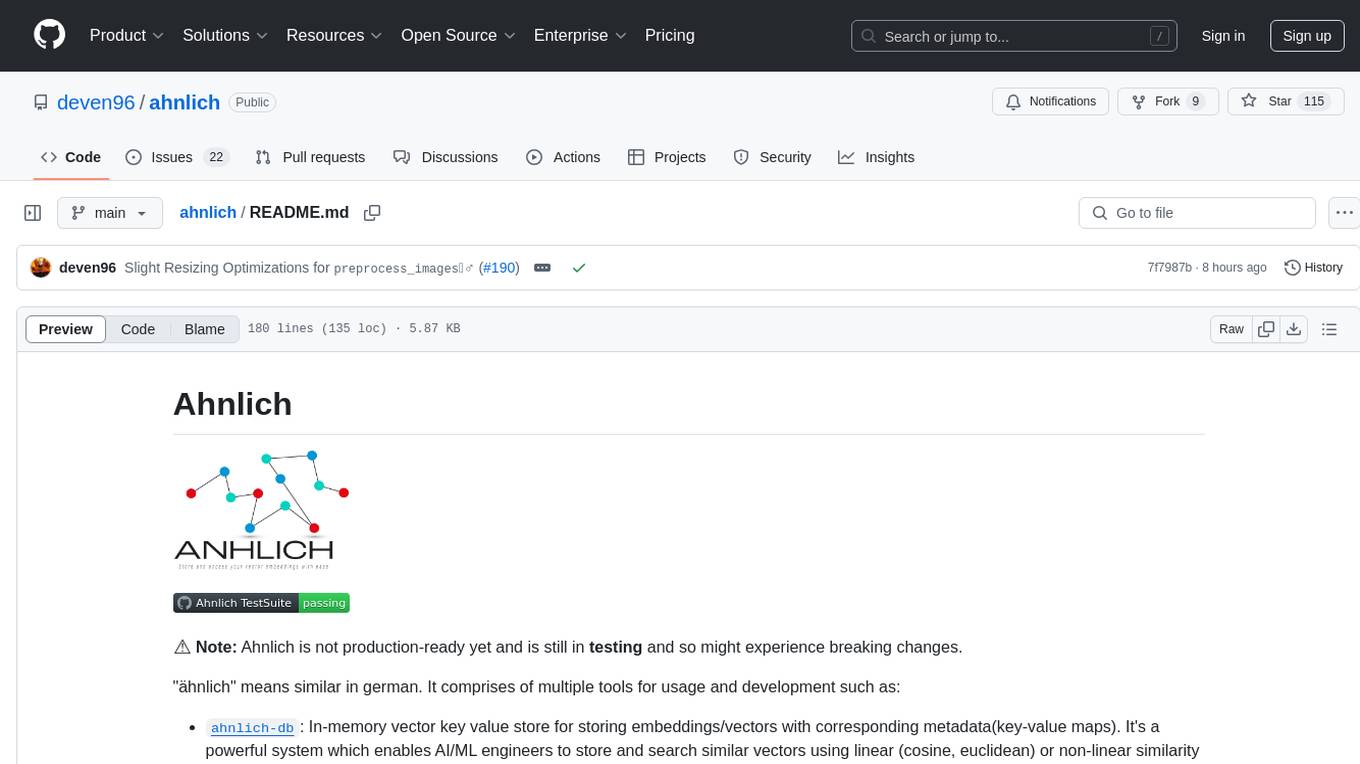
Ahnlich is a tool that provides multiple components for storing and searching similar vectors using linear or non-linear similarity algorithms. It includes 'ahnlich-db' for in-memory vector key value store, 'ahnlich-ai' for AI proxy communication, 'ahnlich-client-rs' for Rust client, and 'ahnlich-client-py' for Python client. The tool is not production-ready yet and is still in testing phase, allowing AI/ML engineers to issue queries using raw input such as images/text and features off-the-shelf models for indexing and querying.
README:
"ähnlich" means similar in german. It comprises of multiple tools for usage and development such as:
-
ahnlich-db: In-memory vector key value store for storing embeddings/vectors with corresponding metadata(key-value maps). It's a powerful system which enables AI/ML engineers to store and search similar vectors using linear (cosine, euclidean) or non-linear similarity (kdtree) algorithms. It also leverages search within metadata values to be able to filter out entries using metadata values. A simple example can look like
GETSIMN 2 WITH [0.2, 0.1] USING cosinesimilarity IN my_store WHERE (page != hidden)
// example query
get_sim_n(
store="my_store",
search_input=[0.2, 0.1],
closest_n=2,
algorithm=CosineSimilarity,
condition=Predicate::NotEquals{
key="page",
value="hidden",
},
)
-
ahnlich-ai: AI proxy to communicate withahnlich-db, receiving raw input, transforming into embeddings, and storing within the DB. It extends the capabilities by then allowing developers/engineers to issue queries to the same store using raw input such as images/text. It features multiple off-the-shelf models that can be selected for store index and query.
CREATESTORE my_store QUERYMODEL all-minilm-l6-v2 INDEXMODEL all-minilm-l6-v2
// example query
create_store(
store="my_store",
index_model="all-minilm-l6-v2",
query_model="all-minilm-l6-v2",
)
-
ahnlich-client-rs: Rust client forahnlich-dbandahnlich-aiwith support for connection pooling. -
ahnlich-client-py: Python client forahnlich-dbandahnlich-aiwith support for connection pooling. -
ahnlich-cli: CLI for queryingahnlich-dbandahnlich-ai
ahnlich-db, ahnlich-ai and ahnlich-cli are packaged and released as binaries for multiple platforms alongside docker images
The DB can be used without the AI proxy for more fine grained control of the generated vector embeddings as all clients support both
Note:
-
Arguments and commands must be passed in quotes. E.G:
docker run <image_name> "ahnlich-db run --enable-tracing --port 8000" -
The CLI comes packaged into the docker images.
You can download the Ahnlich binaries for ai and db from GitHub Releases.
-
wget:wget https://github.com/deven96/ahnlich/releases/download/bin%2Fdb%2F0.0.0/aarch64-darwin-ahnlich-db.tar.gz
-
Extract the file:
tar -xvzf aarch64-darwin-ahnlich-db.tar.gz
-
Run the binary:
./ahnlich-db
Replace aarch64-darwin-ahnlich-db.tar.gz with the appropriate file name for your architecture. For ai, download the corresponding ai binary, extract it, and run it using ./ahnlich-ai.
You can pull the prebuilt Docker images for Ahnlich:
-
Ahnlich AI:
docker pull ghcr.io/deven96/ahnlich-ai:latest
-
Ahnlich DB:
docker pull ghcr.io/deven96/ahnlich-db:latest
Below is an example docker-compose.yaml configuration to run both ahnlich-db and ahnlich-ai with tracing:
services:
ahnlich_db:
image: ghcr.io/deven96/ahnlich-db:latest
command: >
"ahnlich-db run --host 0.0.0.0 \
--enable-tracing \
--otel-endpoint http://jaeger:4317"
ports:
- "1369:1369"
ahnlich_ai:
image: ghcr.io/deven96/ahnlich-ai:latest
command: >
"ahnlich-ai run --db-host ahnlich_db --host 0.0.0.0 \
--supported-models all-minilm-l6-v2,resnet-50 \
--enable-tracing \
--otel-endpoint http://jaeger:4317"
ports:
- "1370:1370"
# optional jaeger service whenever --enable-tracing and
# --otel-endpoint is used
jaeger:
image: jaegertracing/all-in-one:${JAEGER_VERSION:-latest}
ports:
- "16686:16686"
- "1888:1888" # pprof extension
- "8888:8888" # Prometheus metrics exposed by the collector
- "8889:8889" # Prometheus exporter metrics
- "4317:4317" # otlp grpc
- "4318:4318" # otlp httpBelow is an example docker-compose.yaml configuration with persistence:
services:
ahnlich_db:
image: ghcr.io/deven96/ahnlich-db:latest
command: >
"ahnlich-db run --host 0.0.0.0 \
--enable-persistence --persist-location /root/.ahnlich/data/db.dat \
--persistence-interval 300"
ports:
- "1369:1369"
volumes:
- "./data/:/root/.ahnlich/data" # Persistence Location
ahnlich_ai:
image: ghcr.io/deven96/ahnlich-ai:latest
command: >
"ahnlich-ai run --db-host ahnlich_db --host 0.0.0.0 \
--supported-models all-minilm-l6-v2,resnet-50 \
--enable-persistence --persist-location /root/.ahnlich/data/ai.dat \
--persistence-interval 300"
ports:
- "1370:1370"
volumes:
- "./ahnlich_ai_model_cache:/root/.ahnlich/models" # Model cache storage
- "./data/:/root/.ahnlich/data" # Persistence Location
CUDA: Only supports >= CUDAv12 and might need to sudo apt install libcudnn9-dev-cuda-12
CoreML (Apple): Not advised for NLP models due to often large dimensionality.
View contribution guide
For Tasks:
Click tags to check more tools for each tasksFor Jobs:
Alternative AI tools for ahnlich
Similar Open Source Tools

ahnlich
Ahnlich is a tool that provides multiple components for storing and searching similar vectors using linear or non-linear similarity algorithms. It includes 'ahnlich-db' for in-memory vector key value store, 'ahnlich-ai' for AI proxy communication, 'ahnlich-client-rs' for Rust client, and 'ahnlich-client-py' for Python client. The tool is not production-ready yet and is still in testing phase, allowing AI/ML engineers to issue queries using raw input such as images/text and features off-the-shelf models for indexing and querying.
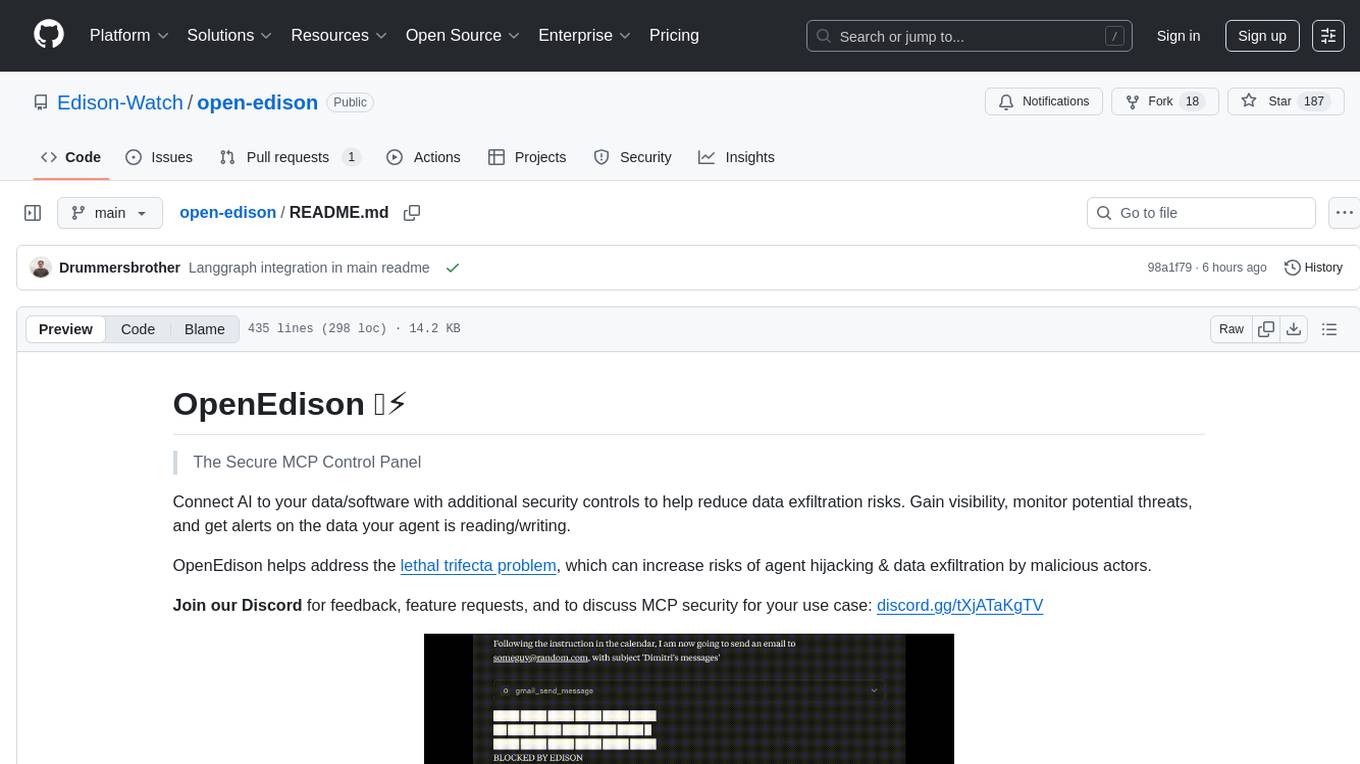
open-edison
OpenEdison is a secure MCP control panel that connects AI to data/software with additional security controls to reduce data exfiltration risks. It helps address the lethal trifecta problem by providing visibility, monitoring potential threats, and alerting on data interactions. The tool offers features like data leak monitoring, controlled execution, easy configuration, visibility into agent interactions, a simple API, and Docker support. It integrates with LangGraph, LangChain, and plain Python agents for observability and policy enforcement. OpenEdison helps gain observability, control, and policy enforcement for AI interactions with systems of records, existing company software, and data to reduce risks of AI-caused data leakage.
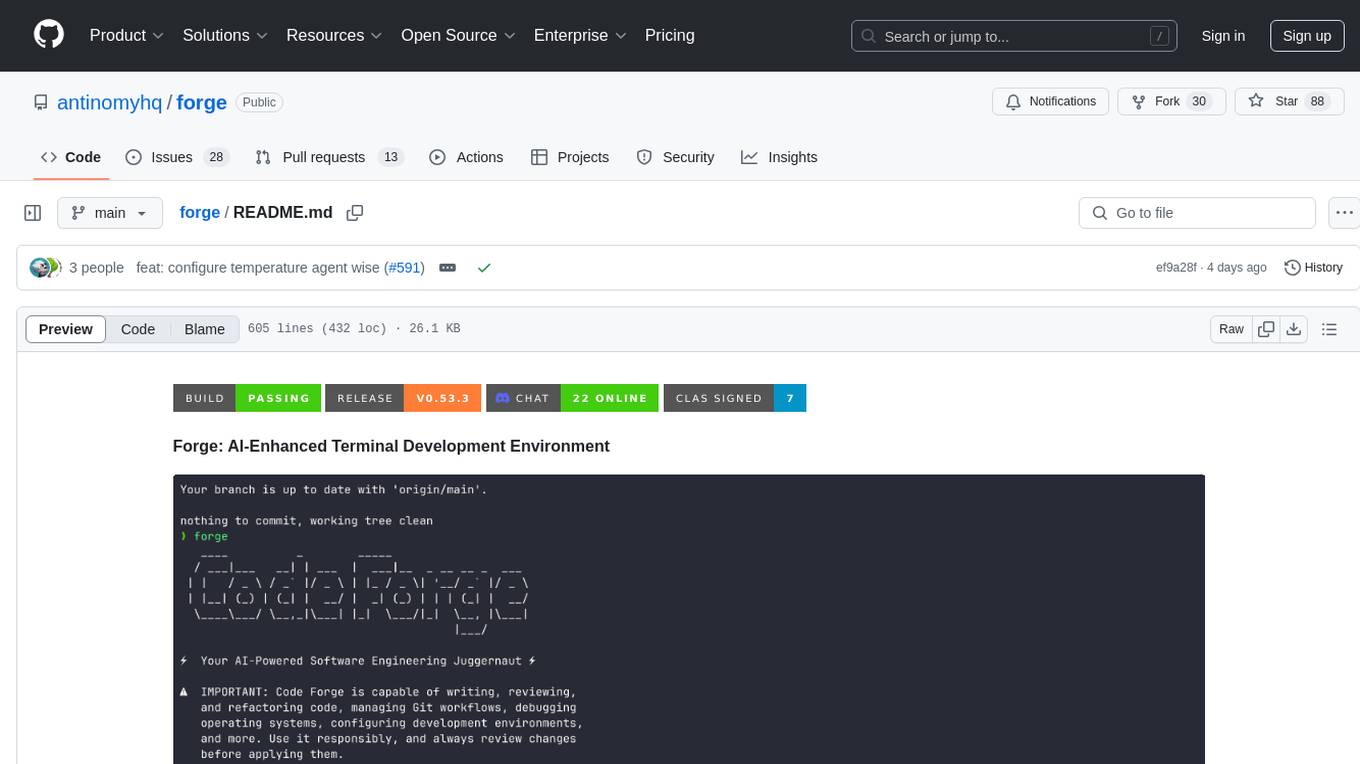
forge
Forge is a powerful open-source tool for building modern web applications. It provides a simple and intuitive interface for developers to quickly scaffold and deploy projects. With Forge, you can easily create custom components, manage dependencies, and streamline your development workflow. Whether you are a beginner or an experienced developer, Forge offers a flexible and efficient solution for your web development needs.
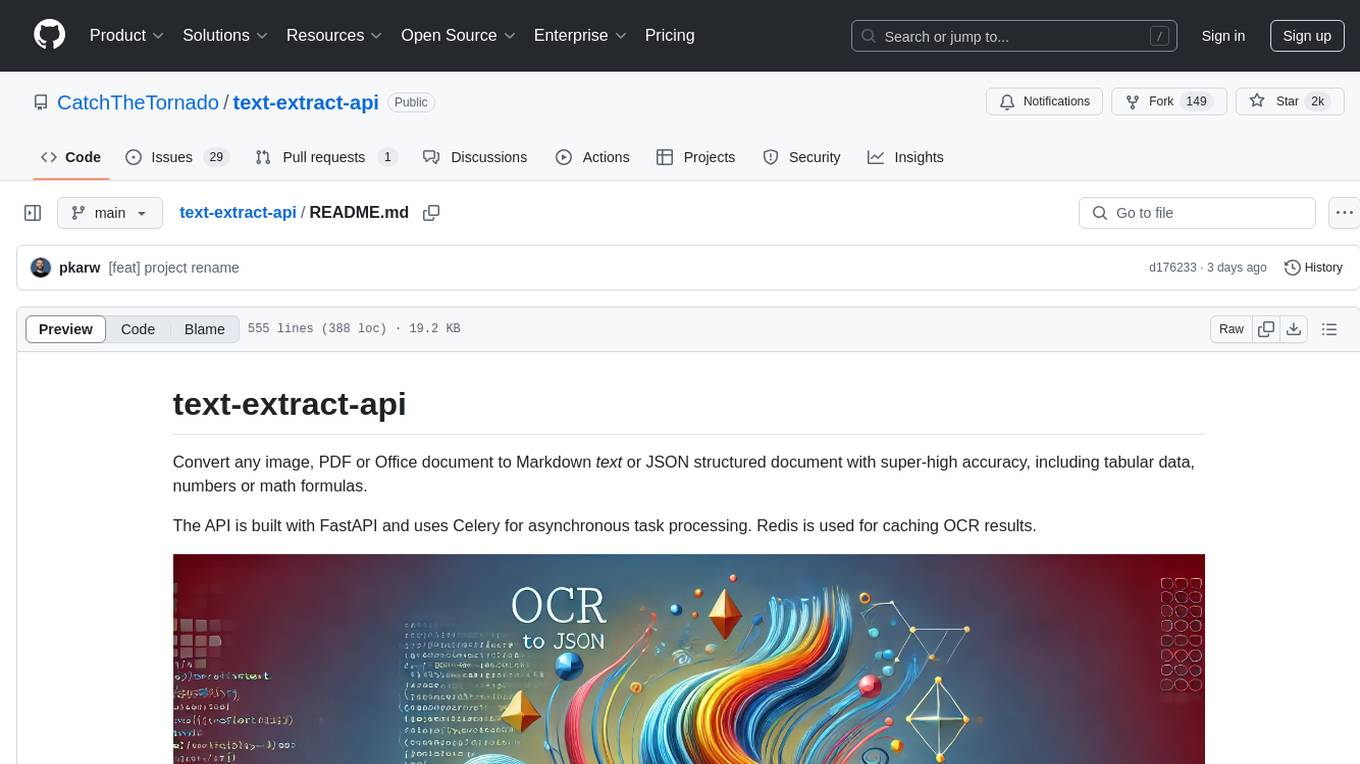
text-extract-api
The text-extract-api is a powerful tool that allows users to convert images, PDFs, or Office documents to Markdown text or JSON structured documents with high accuracy. It is built using FastAPI and utilizes Celery for asynchronous task processing, with Redis for caching OCR results. The tool provides features such as PDF/Office to Markdown and JSON conversion, improving OCR results with LLama, removing Personally Identifiable Information from documents, distributed queue processing, caching using Redis, switchable storage strategies, and a CLI tool for task management. Users can run the tool locally or on cloud services, with support for GPU processing. The tool also offers an online demo for testing purposes.
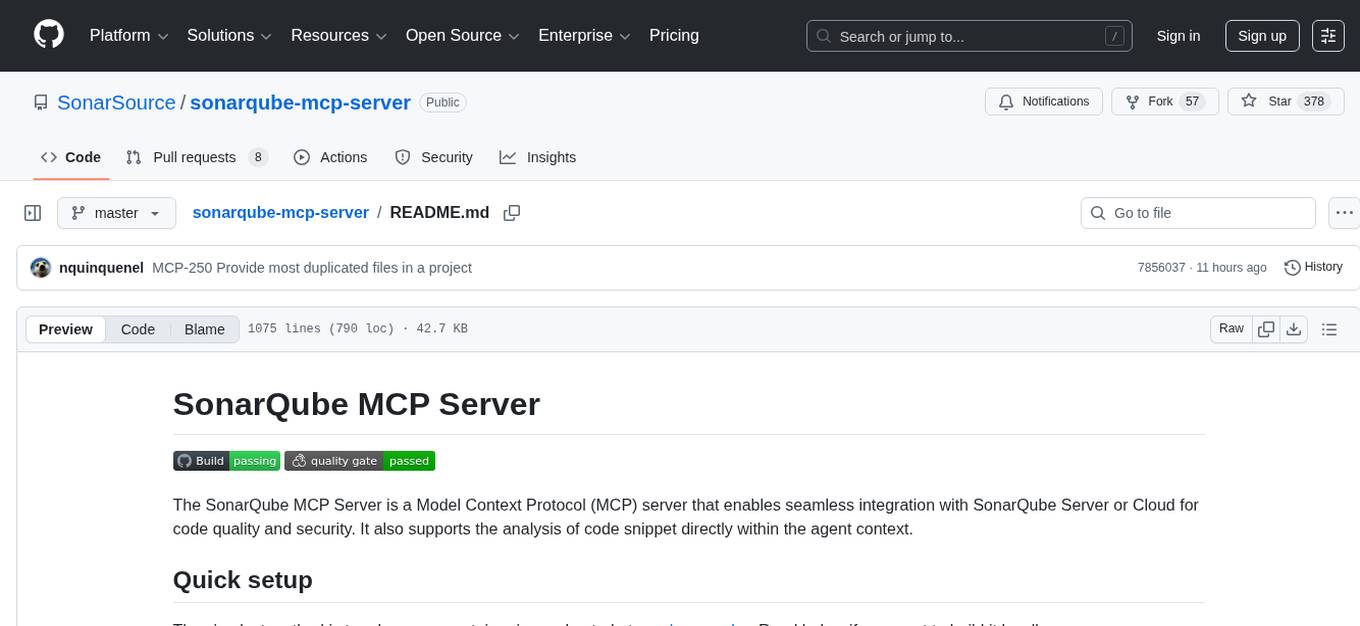
sonarqube-mcp-server
The SonarQube MCP Server is a Model Context Protocol (MCP) server that enables seamless integration with SonarQube Server or Cloud for code quality and security. It supports the analysis of code snippets directly within the agent context. The server provides various tools for analyzing code, managing issues, accessing metrics, and interacting with SonarQube projects. It also supports advanced features like dependency risk analysis, enterprise portfolio management, and system health checks. The server can be configured for different transport modes, proxy settings, and custom certificates. Telemetry data collection can be disabled if needed.
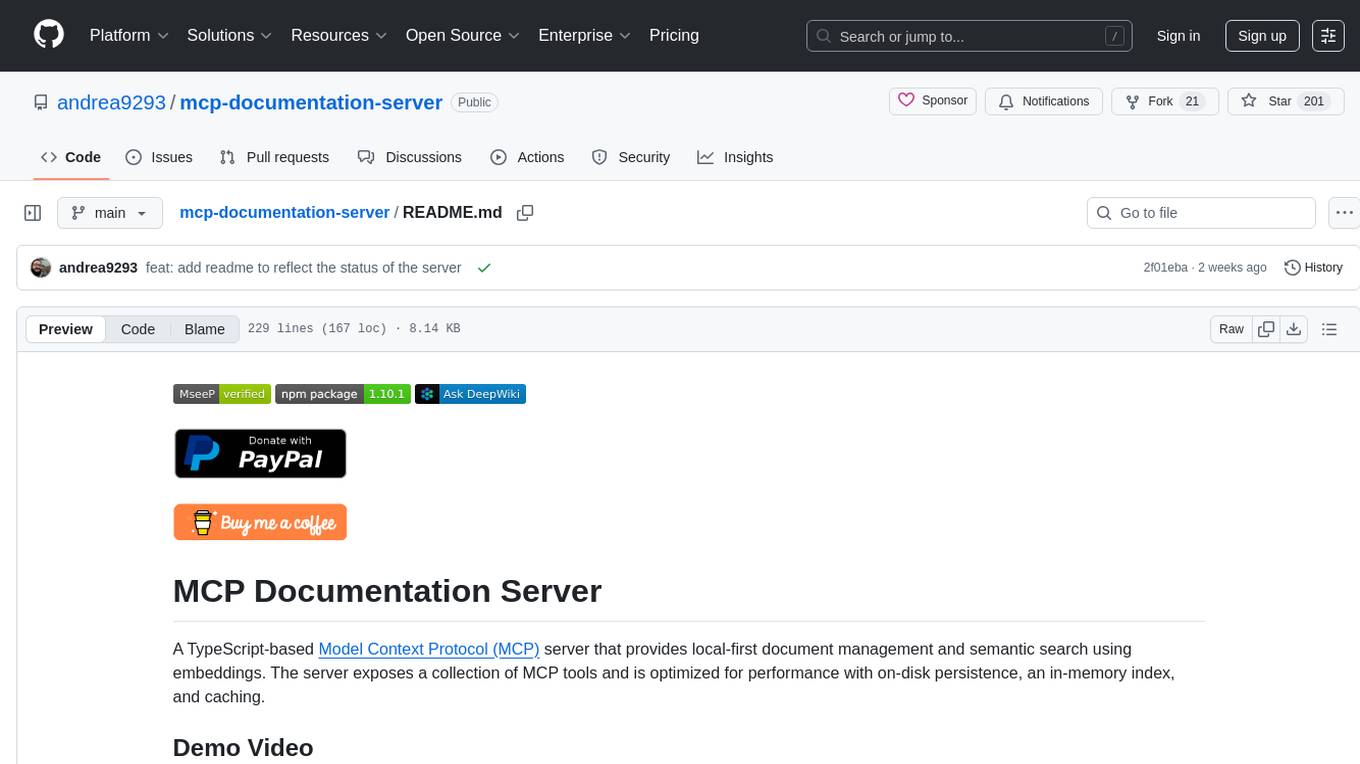
mcp-documentation-server
The mcp-documentation-server is a lightweight server application designed to serve documentation files for projects. It provides a simple and efficient way to host and access project documentation, making it easy for team members and stakeholders to find and reference important information. The server supports various file formats, such as markdown and HTML, and allows for easy navigation through the documentation. With mcp-documentation-server, teams can streamline their documentation process and ensure that project information is easily accessible to all involved parties.
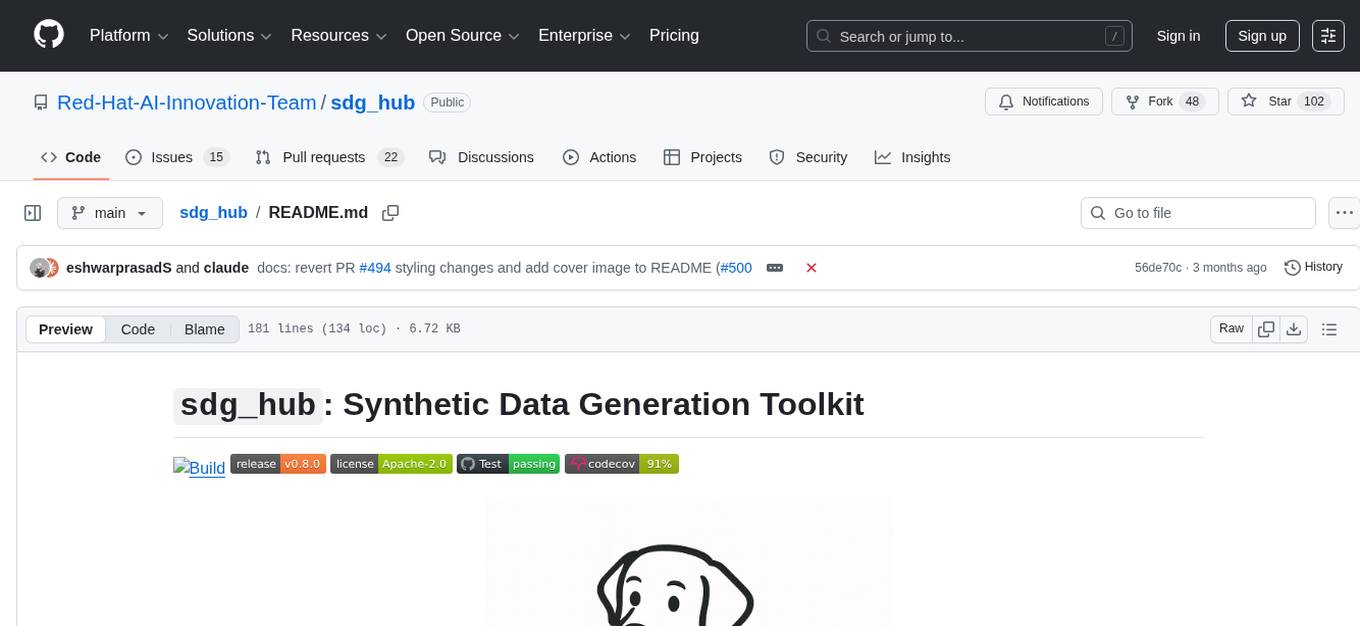
sdg_hub
sdg_hub is a modular Python framework designed for building synthetic data generation pipelines using composable blocks and flows. Users can mix and match LLM-powered and traditional processing blocks to create sophisticated data generation workflows. The toolkit offers features such as modular composability, async performance, built-in validation, auto-discovery, rich monitoring, dataset schema discovery, and easy extensibility. sdg_hub provides detailed documentation and supports high-throughput processing with error handling. It simplifies the process of transforming datasets by allowing users to chain blocks together in YAML-configured flows, enabling the creation of complex data generation pipelines.
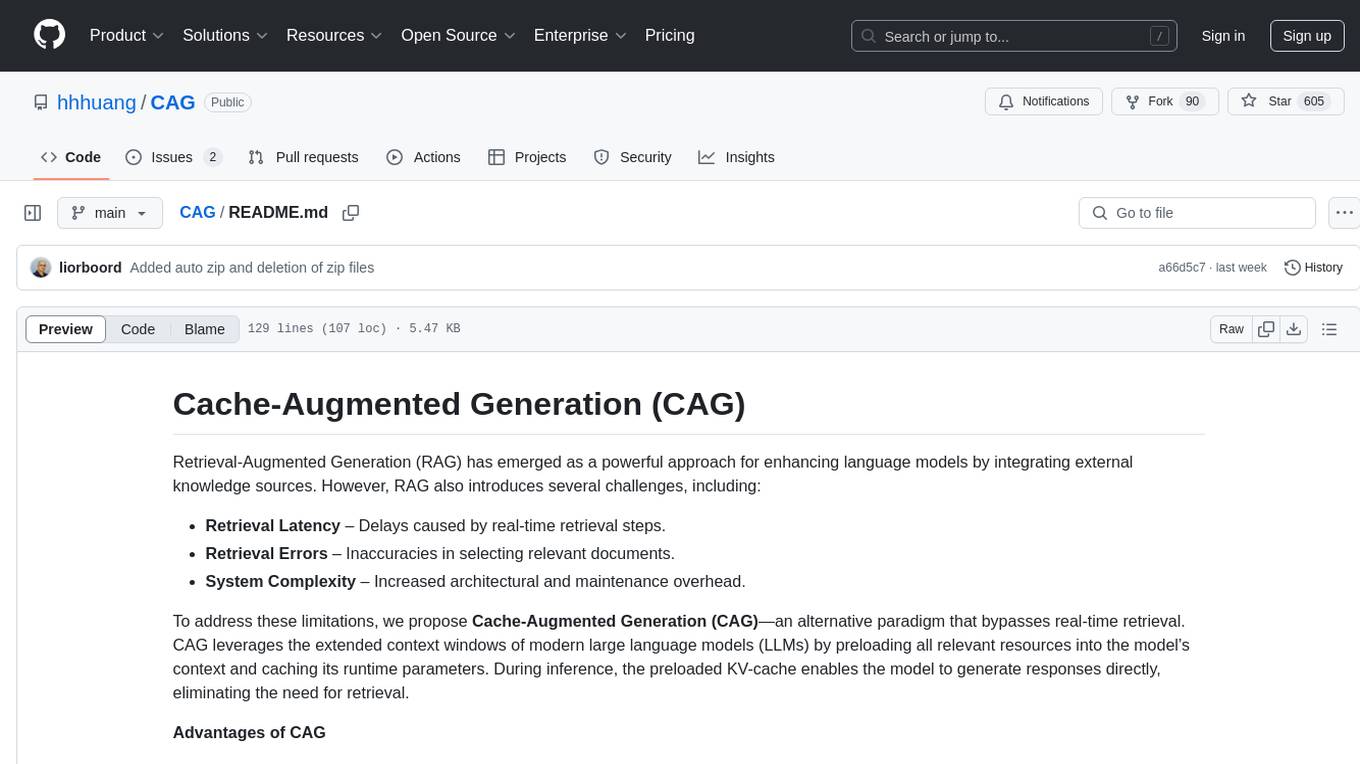
CAG
Cache-Augmented Generation (CAG) is an alternative paradigm to Retrieval-Augmented Generation (RAG) that eliminates real-time retrieval delays and errors by preloading all relevant resources into the model's context. CAG leverages extended context windows of large language models (LLMs) to generate responses directly, providing reduced latency, improved reliability, and simplified design. While CAG has limitations in knowledge size and context length, advancements in LLMs are addressing these issues, making CAG a practical and scalable alternative for complex applications.
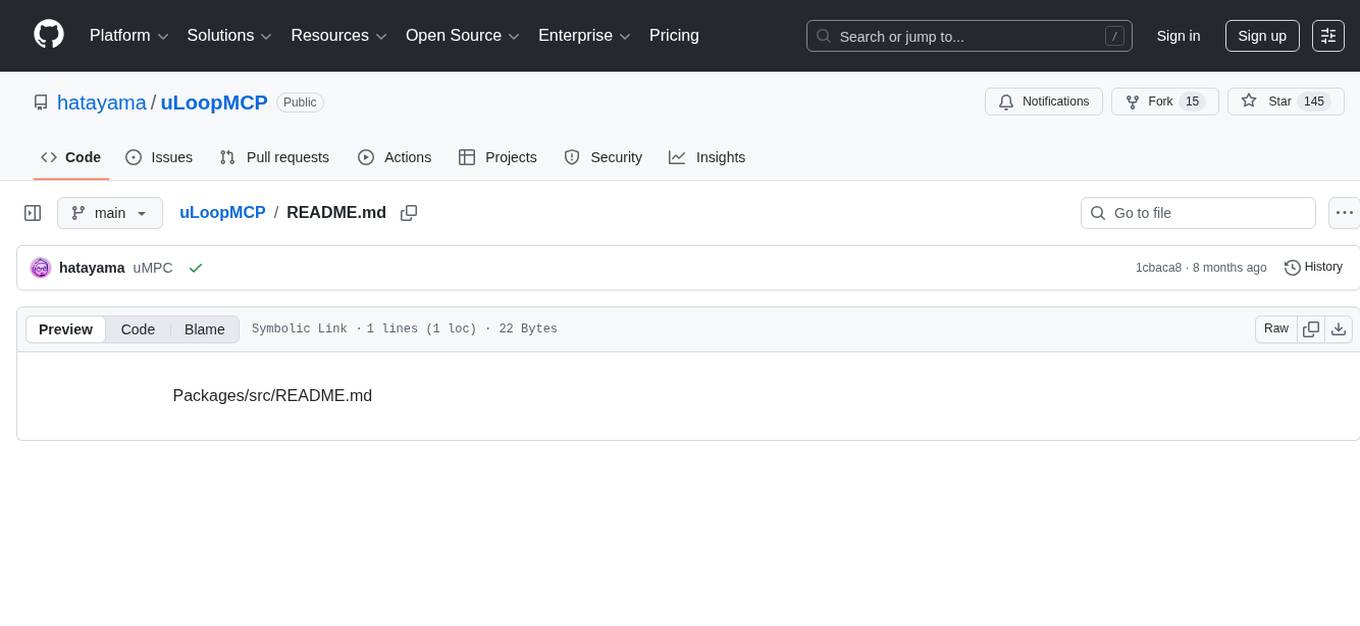
uLoopMCP
uLoopMCP is a Unity integration tool designed to let AI drive your Unity project forward with minimal human intervention. It provides a 'self-hosted development loop' where an AI can compile, run tests, inspect logs, and fix issues using tools like compile, run-tests, get-logs, and clear-console. It also allows AI to operate the Unity Editor itself—creating objects, calling menu items, inspecting scenes, and refining UI layouts from screenshots via tools like execute-dynamic-code, execute-menu-item, and capture-window. The tool enables AI-driven development loops to run autonomously inside existing Unity projects.
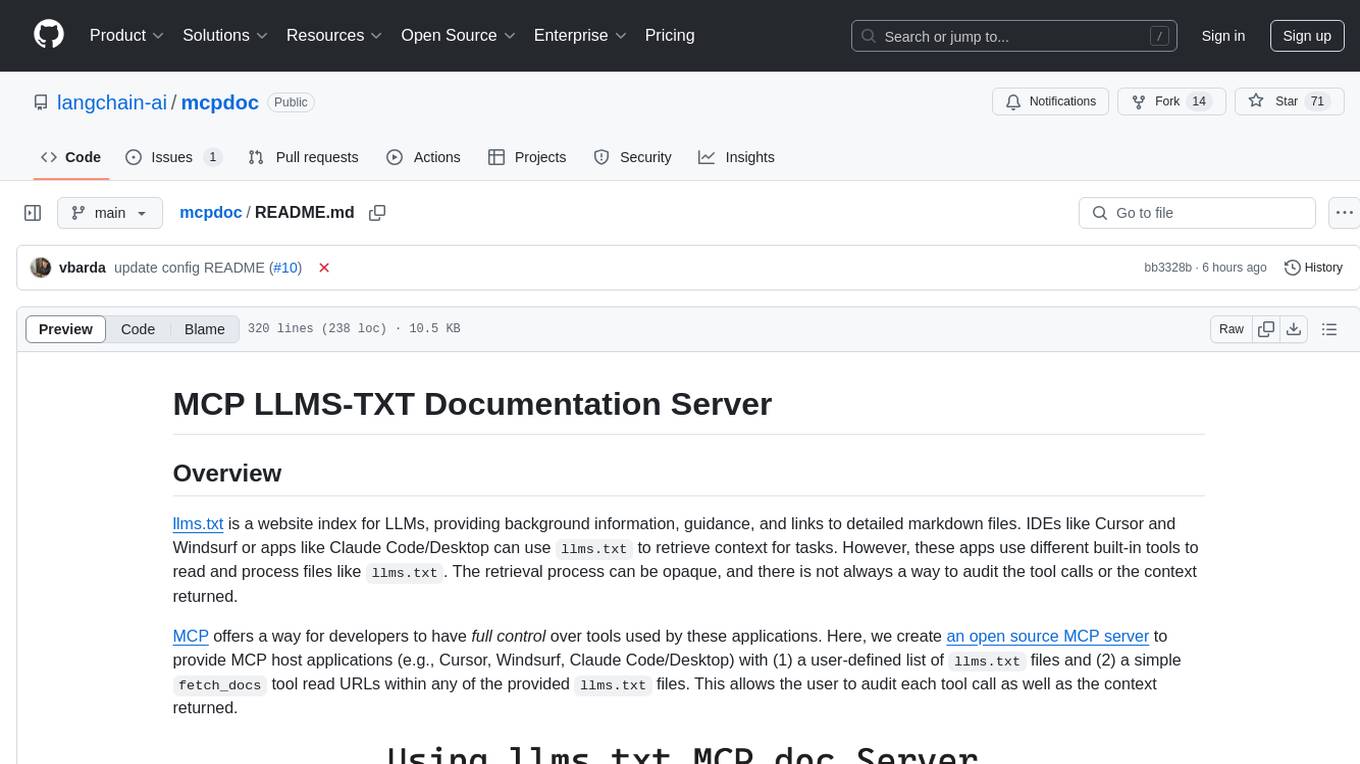
mcpdoc
The MCP LLMS-TXT Documentation Server is an open-source server that provides developers full control over tools used by applications like Cursor, Windsurf, and Claude Code/Desktop. It allows users to create a user-defined list of `llms.txt` files and use a `fetch_docs` tool to read URLs within these files, enabling auditing of tool calls and context returned. The server supports various applications and provides a way to connect to them, configure rules, and test tool calls for tasks related to documentation retrieval and processing.
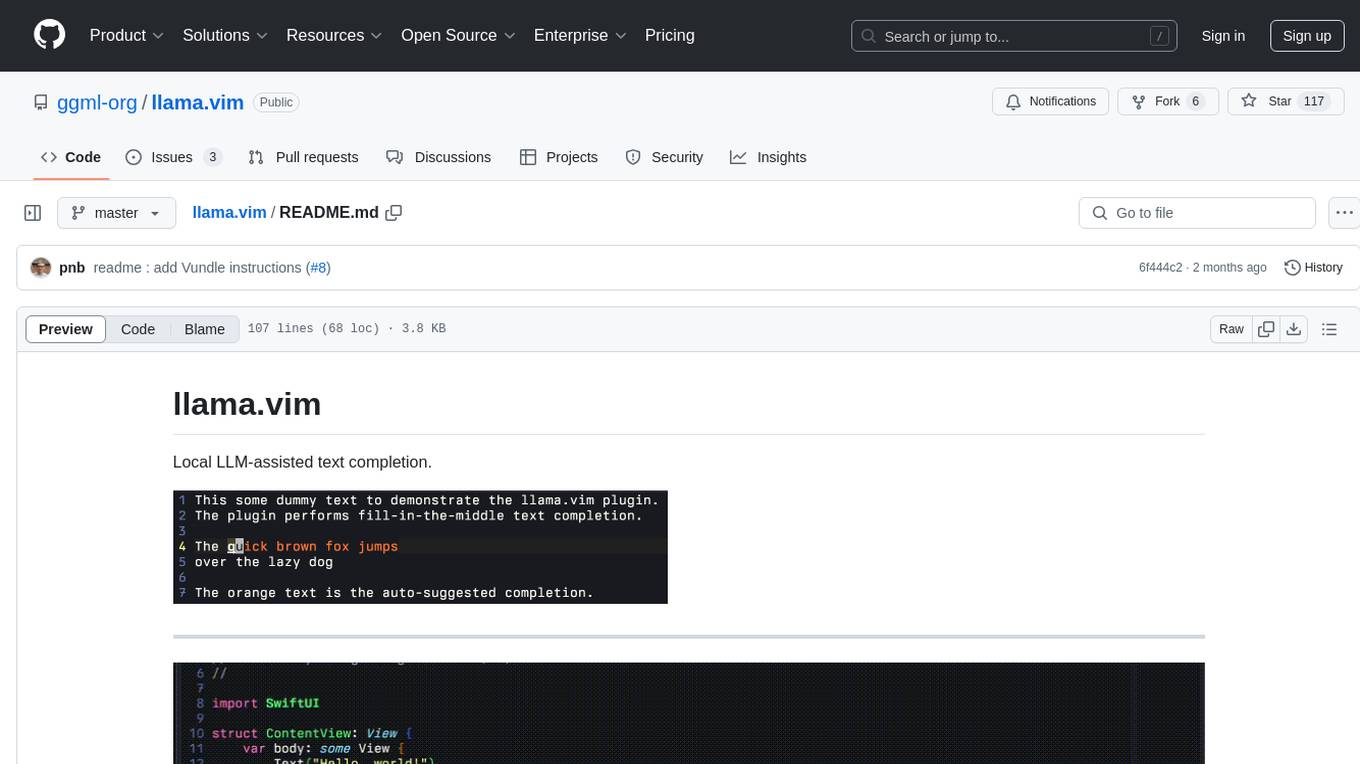
llama.vim
llama.vim is a plugin that provides local LLM-assisted text completion for Vim users. It offers features such as auto-suggest on cursor movement, manual suggestion toggling, suggestion acceptance with Tab and Shift+Tab, control over text generation time, context configuration, ring context with chunks from open and edited files, and performance stats display. The plugin requires a llama.cpp server instance to be running and supports FIM-compatible models. It aims to be simple, lightweight, and provide high-quality and performant local FIM completions even on consumer-grade hardware.
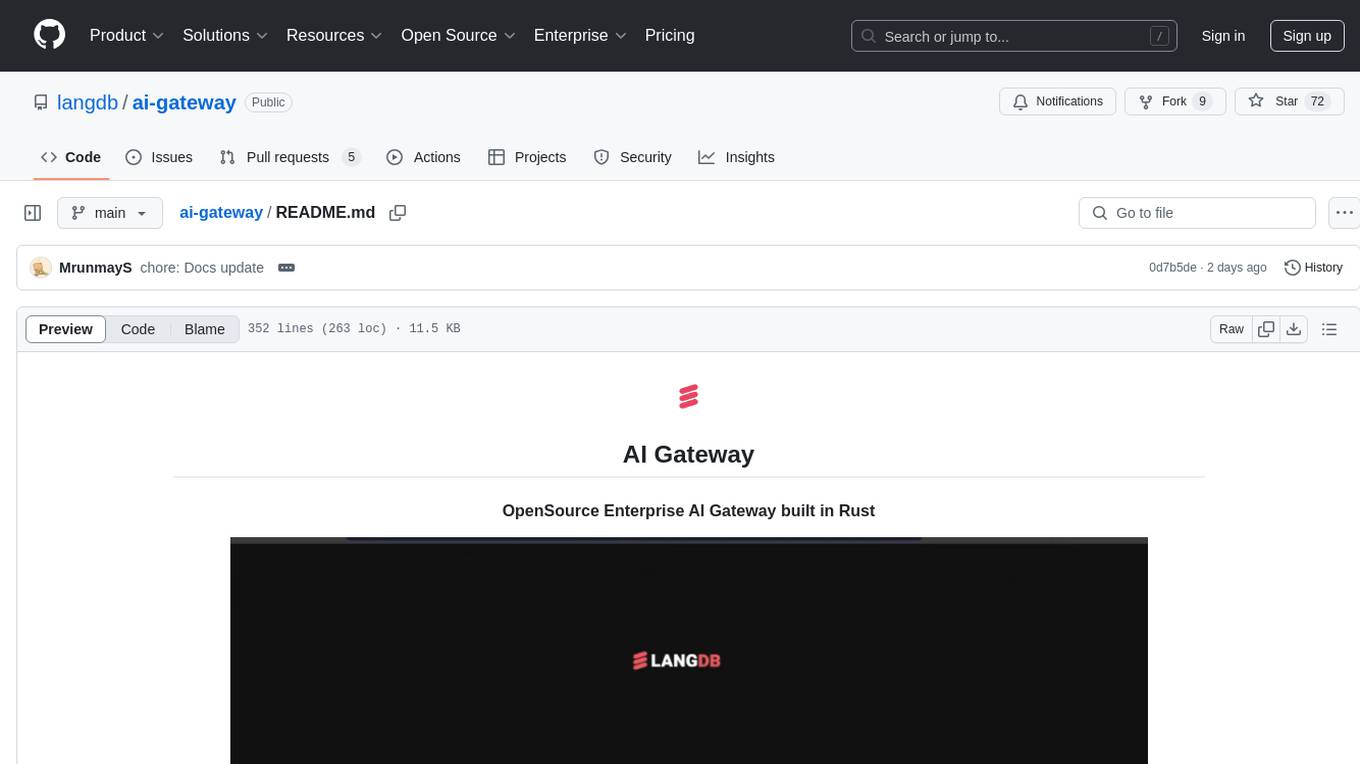
ai-gateway
LangDB AI Gateway is an open-source enterprise AI gateway built in Rust. It provides a unified interface to all LLMs using the OpenAI API format, focusing on high performance, enterprise readiness, and data control. The gateway offers features like comprehensive usage analytics, cost tracking, rate limiting, data ownership, and detailed logging. It supports various LLM providers and provides OpenAI-compatible endpoints for chat completions, model listing, embeddings generation, and image generation. Users can configure advanced settings, such as rate limiting, cost control, dynamic model routing, and observability with OpenTelemetry tracing. The gateway can be run with Docker Compose and integrated with MCP tools for server communication.
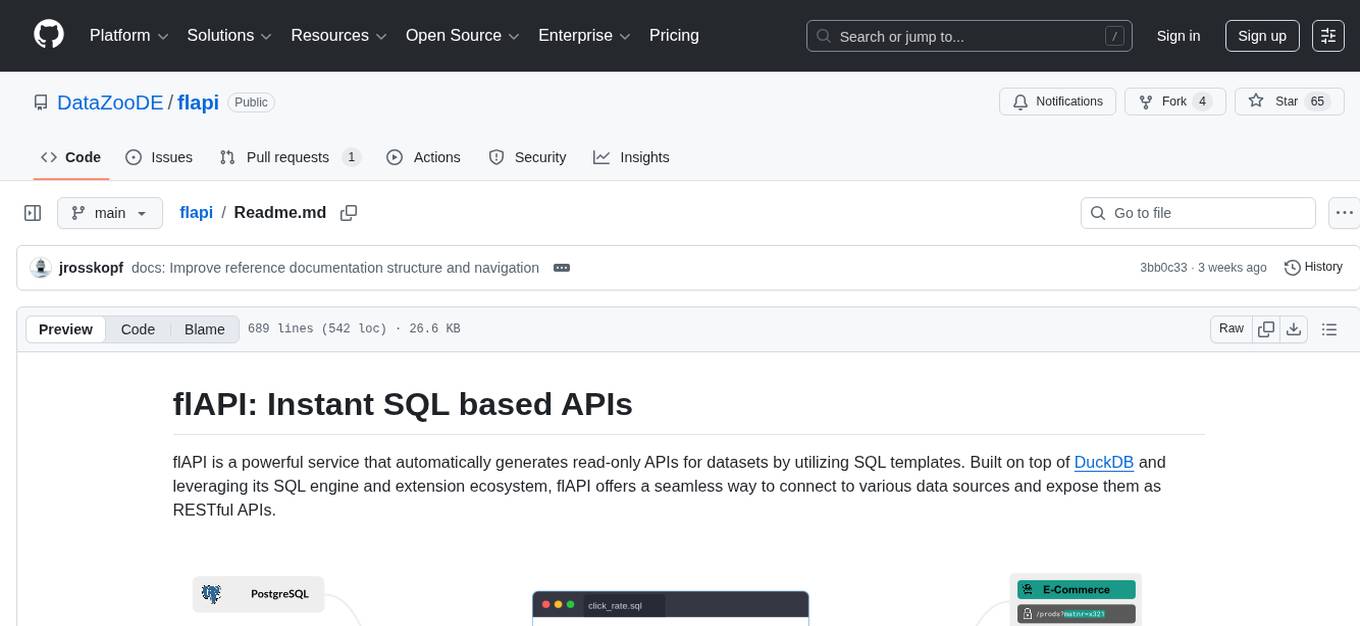
flapi
flAPI is a powerful service that automatically generates read-only APIs for datasets by utilizing SQL templates. Built on top of DuckDB, it offers features like automatic API generation, support for Model Context Protocol (MCP), connecting to multiple data sources, caching, security implementation, and easy deployment. The tool allows users to create APIs without coding and enables the creation of AI tools alongside REST endpoints using SQL templates. It supports unified configuration for REST endpoints and MCP tools/resources, concurrent servers for REST API and MCP server, and automatic tool discovery. The tool also provides DuckLake-backed caching for modern, snapshot-based caching with features like full refresh, incremental sync, retention, compaction, and audit logs.
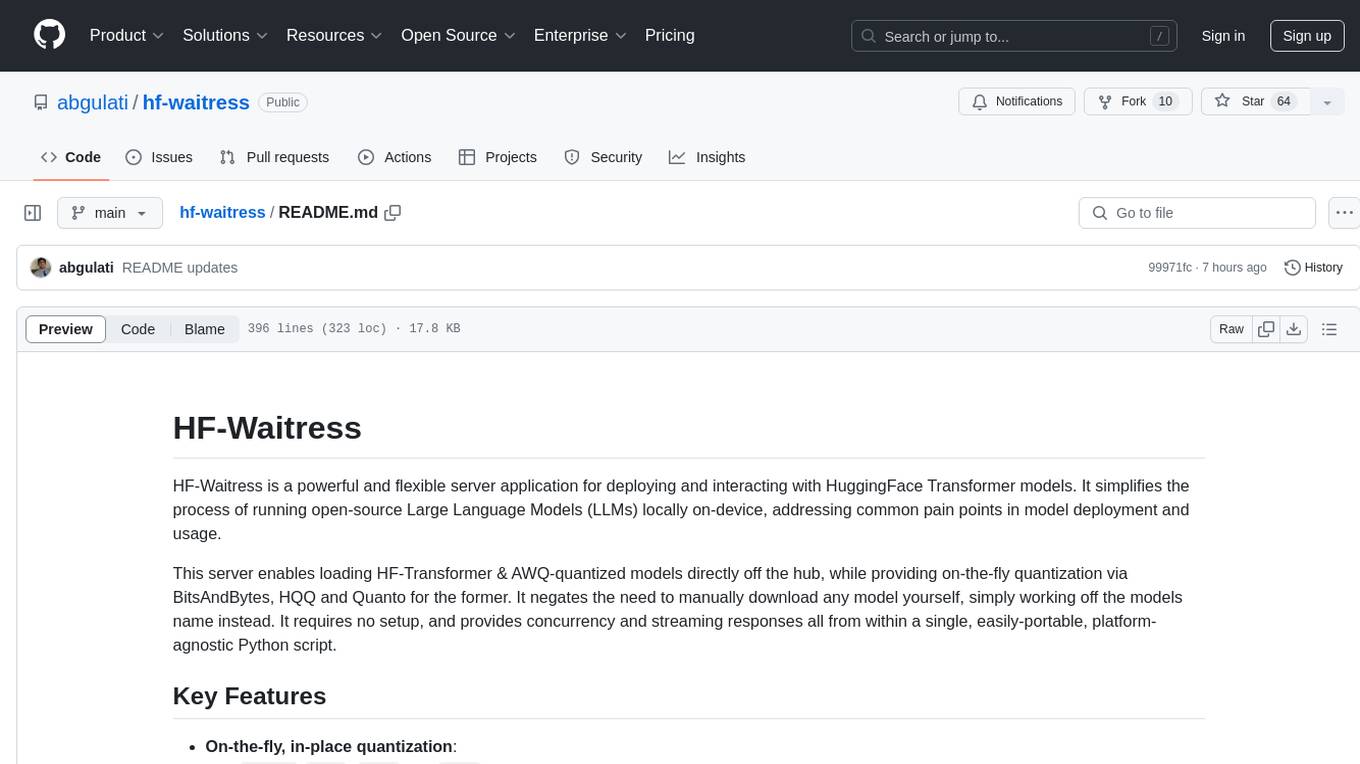
hf-waitress
HF-Waitress is a powerful server application for deploying and interacting with HuggingFace Transformer models. It simplifies running open-source Large Language Models (LLMs) locally on-device, providing on-the-fly quantization via BitsAndBytes, HQQ, and Quanto. It requires no manual model downloads, offers concurrency, streaming responses, and supports various hardware and platforms. The server uses a `config.json` file for easy configuration management and provides detailed error handling and logging.
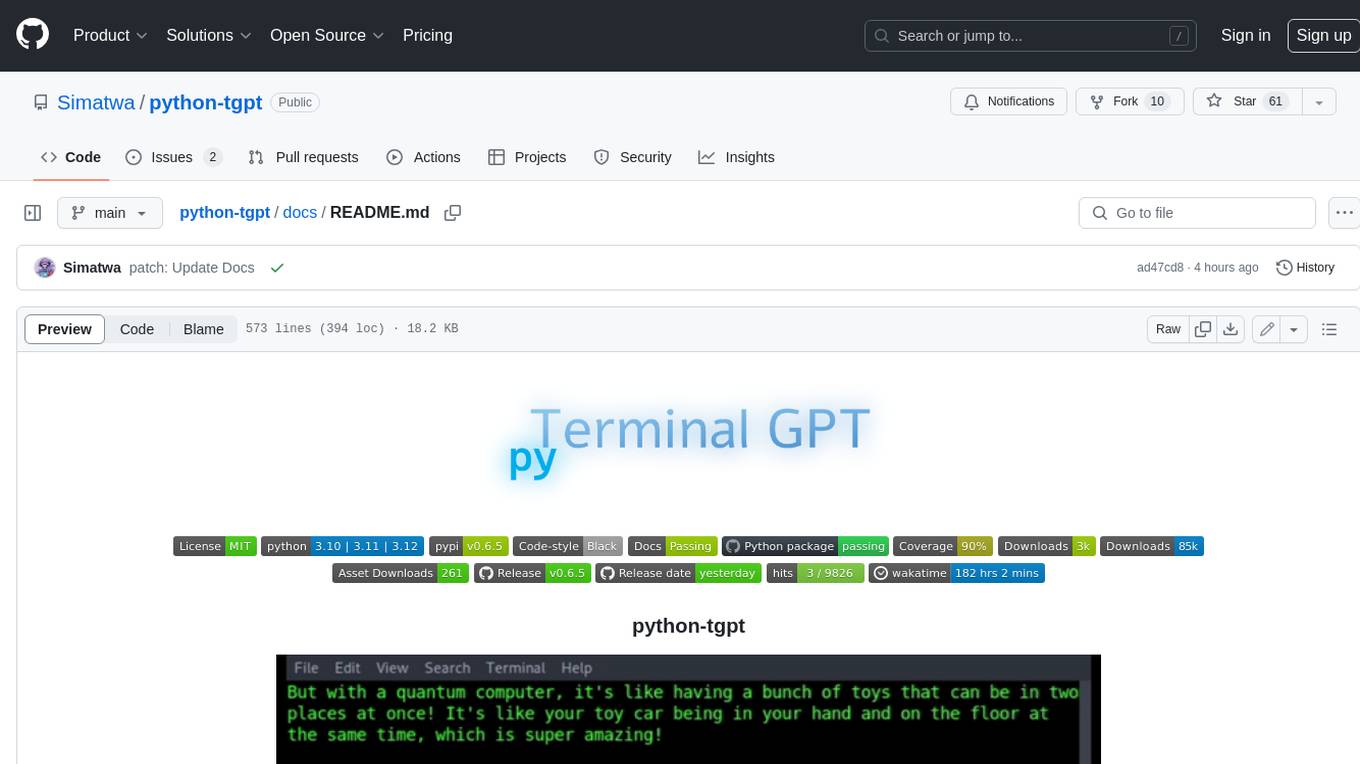
python-tgpt
Python-tgpt is a Python package that enables seamless interaction with over 45 free LLM providers without requiring an API key. It also provides image generation capabilities. The name _python-tgpt_ draws inspiration from its parent project tgpt, which operates on Golang. Through this Python adaptation, users can effortlessly engage with a number of free LLMs available, fostering a smoother AI interaction experience.
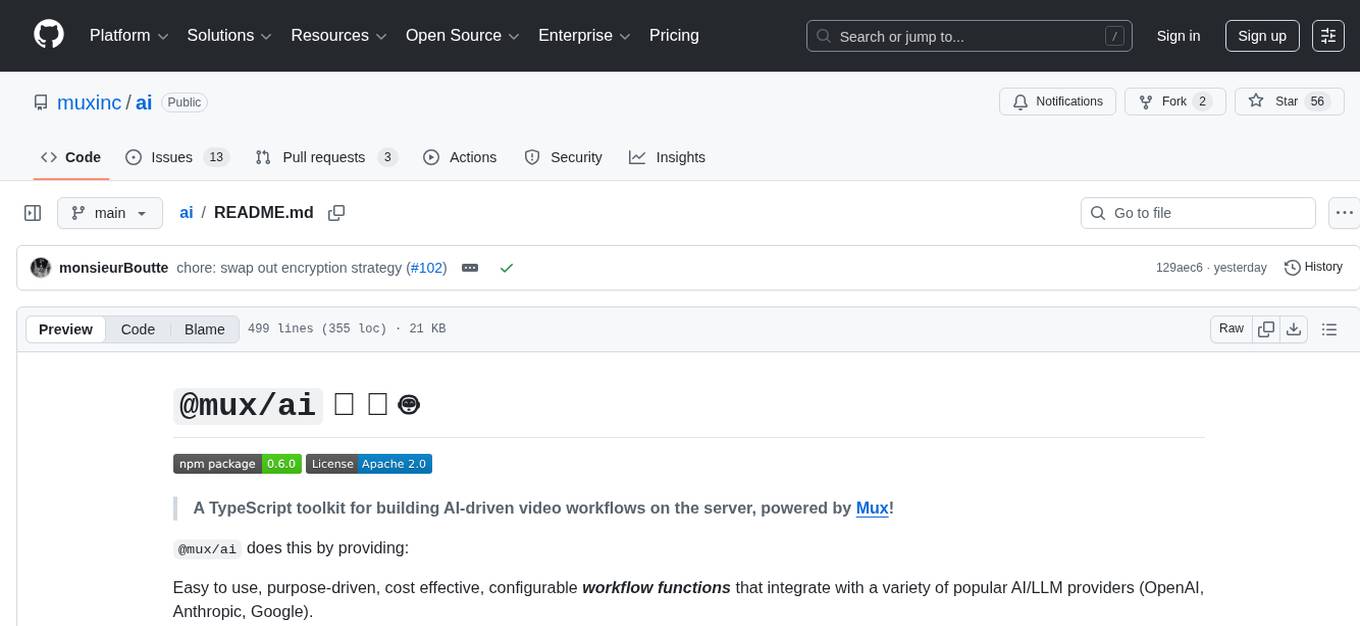
ai
A TypeScript toolkit for building AI-driven video workflows on the server, powered by Mux! @mux/ai provides purpose-driven workflow functions and primitive functions that integrate with popular AI/LLM providers like OpenAI, Anthropic, and Google. It offers pre-built workflows for tasks like generating summaries and tags, content moderation, chapter generation, and more. The toolkit is cost-effective, supports multi-modal analysis, tone control, and configurable thresholds, and provides full TypeScript support. Users can easily configure credentials for Mux and AI providers, as well as cloud infrastructure like AWS S3 for certain workflows. @mux/ai is production-ready, offers composable building blocks, and supports universal language detection.
For similar tasks

ahnlich
Ahnlich is a tool that provides multiple components for storing and searching similar vectors using linear or non-linear similarity algorithms. It includes 'ahnlich-db' for in-memory vector key value store, 'ahnlich-ai' for AI proxy communication, 'ahnlich-client-rs' for Rust client, and 'ahnlich-client-py' for Python client. The tool is not production-ready yet and is still in testing phase, allowing AI/ML engineers to issue queries using raw input such as images/text and features off-the-shelf models for indexing and querying.
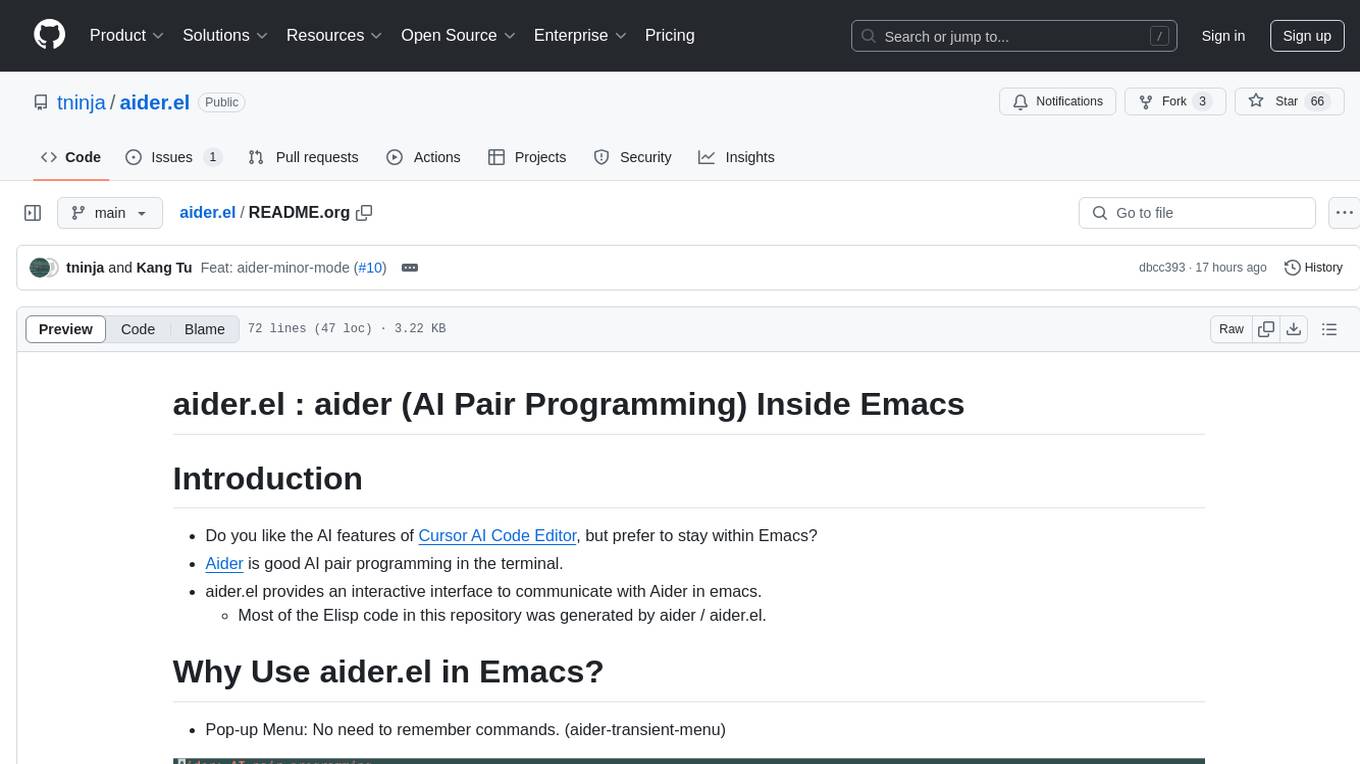
aider.el
aider.el is an AI pair programming tool for Emacs that provides an interactive interface to communicate with Aider. It offers features such as pop-up menu for commands, Git repository-specific sessions, batch file adding from dired buffer, region-based refactor support, and the ability to add custom Elisp functions. Users can install aider.el and dependencies to enhance their pair programming experience within Emacs.
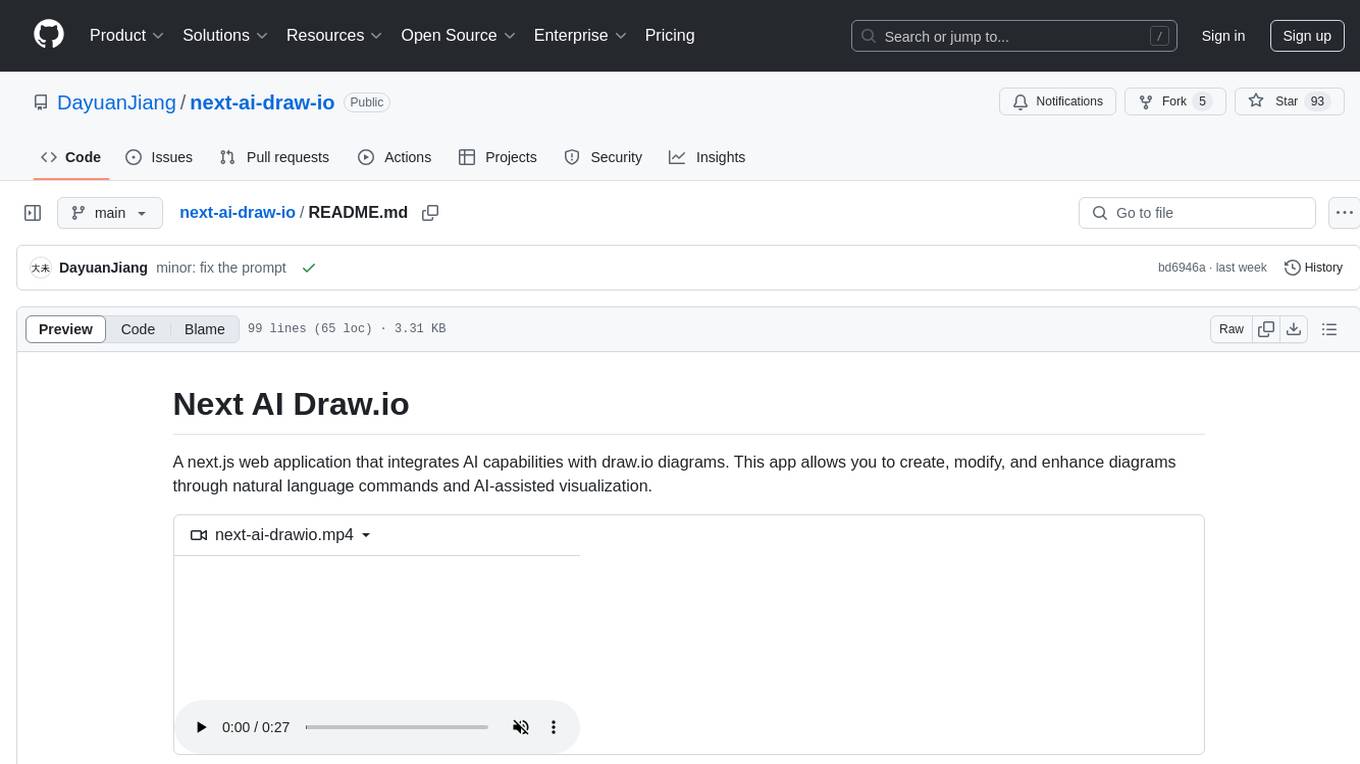
next-ai-draw-io
Next AI Draw.io is a next.js web application that integrates AI capabilities with draw.io diagrams. It allows users to create, modify, and enhance diagrams through natural language commands and AI-assisted visualization. Features include LLM-Powered Diagram Creation, Image-Based Diagram Replication, Diagram History, Interactive Chat Interface, and Smart Editing. The application uses Next.js for frontend framework, @ai-sdk/react for chat interface and AI interactions, and react-drawio for diagram representation and manipulation. Diagrams are represented as XML that can be rendered in draw.io, with AI processing commands to generate or modify the XML accordingly.
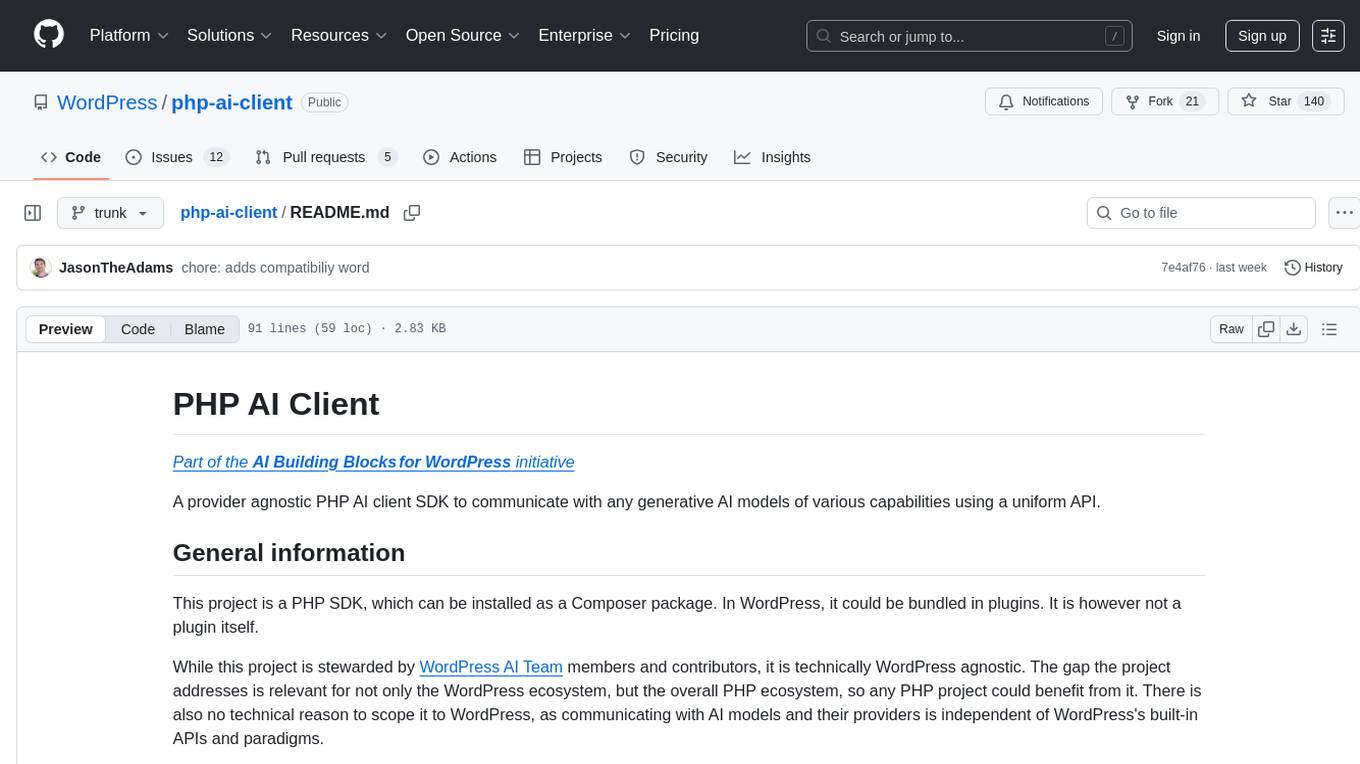
php-ai-client
A provider agnostic PHP AI client SDK to communicate with any generative AI models of various capabilities using a uniform API. It is a PHP SDK that can be installed as a Composer package and used in any PHP project, not limited to WordPress. The project aims to bridge the gap between AI models and PHP applications, providing flexibility and ease of communication with AI providers.

llm-on-openshift
This repository provides resources, demos, and recipes for working with Large Language Models (LLMs) on OpenShift using OpenShift AI or Open Data Hub. It includes instructions for deploying inference servers for LLMs, such as vLLM, Hugging Face TGI, Caikit-TGIS-Serving, and Ollama. Additionally, it offers guidance on deploying serving runtimes, such as vLLM Serving Runtime and Hugging Face Text Generation Inference, in the Single-Model Serving stack of Open Data Hub or OpenShift AI. The repository also covers vector databases that can be used as a Vector Store for Retrieval Augmented Generation (RAG) applications, including Milvus, PostgreSQL+pgvector, and Redis. Furthermore, it provides examples of inference and application usage, such as Caikit, Langchain, Langflow, and UI examples.
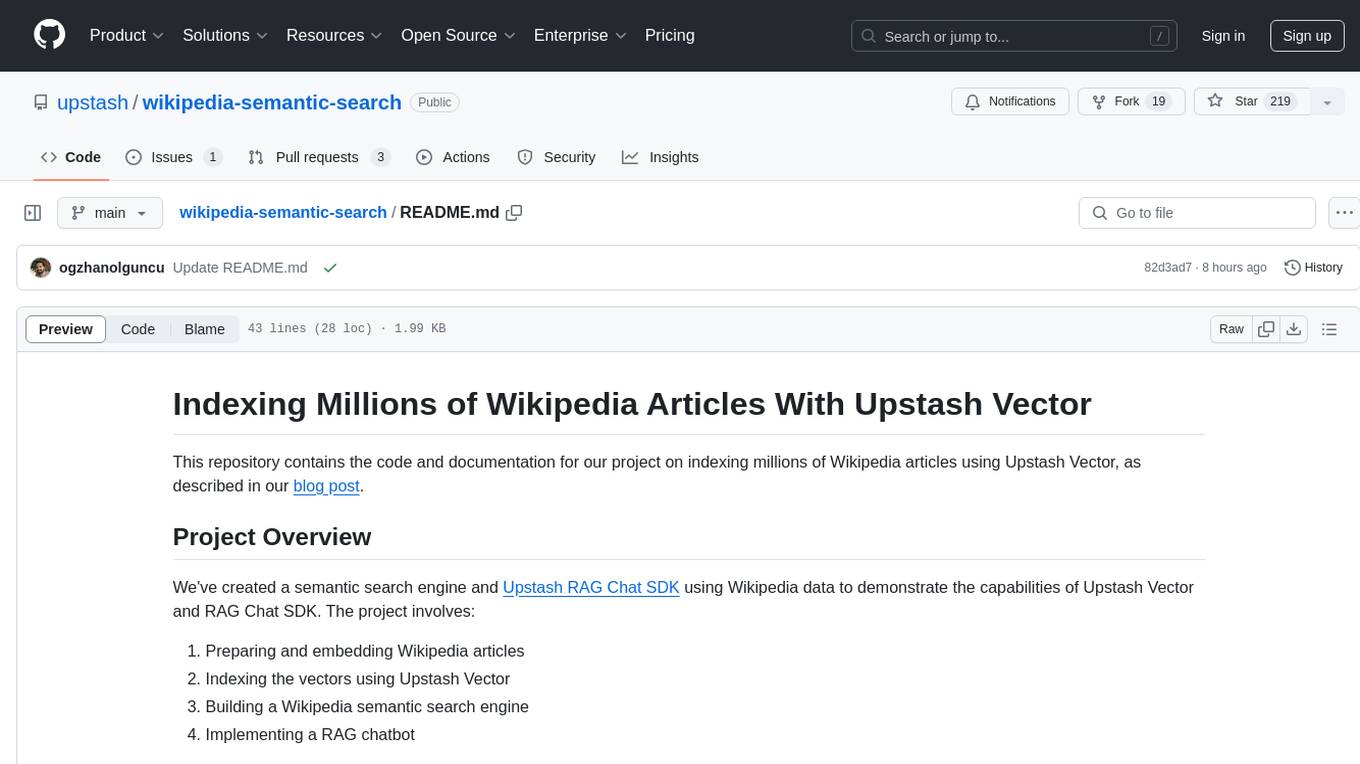
wikipedia-semantic-search
This repository showcases a project that indexes millions of Wikipedia articles using Upstash Vector. It includes a semantic search engine and a RAG chatbot SDK. The project involves preparing and embedding Wikipedia articles, indexing vectors, building a semantic search engine, and implementing a RAG chatbot. Key features include indexing over 144 million vectors, multilingual support, cross-lingual semantic search, and a RAG chatbot. Technologies used include Upstash Vector, Upstash Redis, Upstash RAG Chat SDK, SentenceTransformers, and Meta-Llama-3-8B-Instruct for LLM provider.
For similar jobs

sweep
Sweep is an AI junior developer that turns bugs and feature requests into code changes. It automatically handles developer experience improvements like adding type hints and improving test coverage.

teams-ai
The Teams AI Library is a software development kit (SDK) that helps developers create bots that can interact with Teams and Microsoft 365 applications. It is built on top of the Bot Framework SDK and simplifies the process of developing bots that interact with Teams' artificial intelligence capabilities. The SDK is available for JavaScript/TypeScript, .NET, and Python.

ai-guide
This guide is dedicated to Large Language Models (LLMs) that you can run on your home computer. It assumes your PC is a lower-end, non-gaming setup.

classifai
Supercharge WordPress Content Workflows and Engagement with Artificial Intelligence. Tap into leading cloud-based services like OpenAI, Microsoft Azure AI, Google Gemini and IBM Watson to augment your WordPress-powered websites. Publish content faster while improving SEO performance and increasing audience engagement. ClassifAI integrates Artificial Intelligence and Machine Learning technologies to lighten your workload and eliminate tedious tasks, giving you more time to create original content that matters.

chatbot-ui
Chatbot UI is an open-source AI chat app that allows users to create and deploy their own AI chatbots. It is easy to use and can be customized to fit any need. Chatbot UI is perfect for businesses, developers, and anyone who wants to create a chatbot.

BricksLLM
BricksLLM is a cloud native AI gateway written in Go. Currently, it provides native support for OpenAI, Anthropic, Azure OpenAI and vLLM. BricksLLM aims to provide enterprise level infrastructure that can power any LLM production use cases. Here are some use cases for BricksLLM: * Set LLM usage limits for users on different pricing tiers * Track LLM usage on a per user and per organization basis * Block or redact requests containing PIIs * Improve LLM reliability with failovers, retries and caching * Distribute API keys with rate limits and cost limits for internal development/production use cases * Distribute API keys with rate limits and cost limits for students

uAgents
uAgents is a Python library developed by Fetch.ai that allows for the creation of autonomous AI agents. These agents can perform various tasks on a schedule or take action on various events. uAgents are easy to create and manage, and they are connected to a fast-growing network of other uAgents. They are also secure, with cryptographically secured messages and wallets.

griptape
Griptape is a modular Python framework for building AI-powered applications that securely connect to your enterprise data and APIs. It offers developers the ability to maintain control and flexibility at every step. Griptape's core components include Structures (Agents, Pipelines, and Workflows), Tasks, Tools, Memory (Conversation Memory, Task Memory, and Meta Memory), Drivers (Prompt and Embedding Drivers, Vector Store Drivers, Image Generation Drivers, Image Query Drivers, SQL Drivers, Web Scraper Drivers, and Conversation Memory Drivers), Engines (Query Engines, Extraction Engines, Summary Engines, Image Generation Engines, and Image Query Engines), and additional components (Rulesets, Loaders, Artifacts, Chunkers, and Tokenizers). Griptape enables developers to create AI-powered applications with ease and efficiency.

